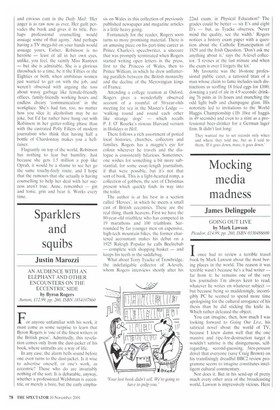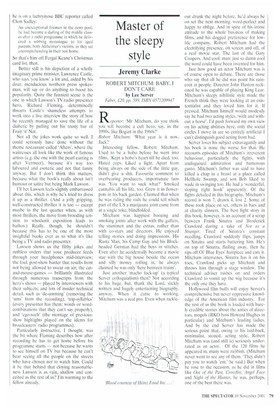Mocking media madness
James Delingpole
GOING OUT LIVE by Mark Lawson
Picador, £14.99, pp. 260, ISBN 0330488600
Ionce had to review a terrible travel book by Mark Lawson about the most boring places in the world, The reason it was terrible wasn't because he's a bad writer — far from it: he remains one of the very few journalists I'm always keen to read, whatever he writes on whatever subject — but because being so maddeningly, incorrigibly PC he seemed to spend more time apologising for the cultural arrogance of his thesis than he did sticking the knife in. Which rather defeated the object.
You can imagine, then, how much I was looking forward to Going Ow Live, his satirical novel about the world of TV, because I knew damn well that the one massive and ripe-for-destruction target it wouldn't satirise is the disingenuous, selfregarding, second-guessing, bien-pensant drivel that everyone (save Craig Brown) on his transfixingly dreadful BBC2 review programme seems to imagine constitutes intelligent cultural commentary.
Nor does it. But in his send-up of pretty much every other area of the broadcasting world, Lawson is impressively vicious. Here he is on a lachtymose BBC reporter called Clem Sadley:
An unexceptional fireman in the news pool, he had become a darling of the middle classes after a radio programme in which he delivered a sobbing monologue to his aged parents, both Alzheimer's victims, as they sat uncomprehending in their rest home.
So that's him off Fergal Keane's Christmas card list, then.
Better still is his depiction of a wholly imaginary prime minister, Lawrence Castle, who says 'you know' a lot and, aided by his dour, mendacious northern press spokesman, will say or do anything to boost his popularity. Quite the funniest scene is the one in which Lawson's TV/radio presenter hero, Richard Fleming, determinedly thwarts Castle's shameless attempts to work into a live interview the story of how he recently managed to save the life of a diabetic by pulling out his trusty bar of Fruit 'n' Nut.
Not all the jokes work quite so well. I could seriously have done without the theme restaurant called 'Afters', where the waitresses all look like the work of famous artists (e.g. the one with the pearl earring is after Vermeer), because it's way too laboured and esoteric and not that funny anyway. But I don't think this matters, because what the book's really about isn't humour or satire but being Mark Lawson.
I'll bet Lawson feels slightly embarrassed about this, which is why he's tried to dress it up as a thriller. (And a jolly gripping, well-constructed thriller it is too — except maybe in the last quarter when, as with most thrillers, the move from brooding tension to whodunit exposition leads to bathos.) Really, though, he shouldn't because this has to be one of the most insightful books ever as to what it's like being a TV and radio presenter.
Lawson shows us the filthy jokes and ruthless orders that your producer feeds through your headphones mid-interview; the foul, post-show banter that results from not being allowed to swear on air; the catand-mouse-games — brilliantly illustrated through numerous transcripts from the hero's shows — played by interviewers with their subjects; and lots of insider technical detail, such as 'de-umming' (removing the 'urns' from the recording), `trip-syllables' (every presenter has them: words or wordcombinations that they can't say properly), and .ego-reels' (the montage of previousshow highlights played on the idents for broadcasters' radio programmes).
Particularly instructive, I thought, was the bit where Fleming describes how after recording he has to get home before his programme starts — not because he wants to see himself on TV but because he can't bear seeing all the people on the streets who have chosen not to watch him. Could it be that behind that cloying reasonableness Lawson is as vain, shallow and conceited as the rest of us? I'm warming to the fellow already.















































































































 Previous page
Previous page